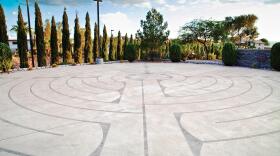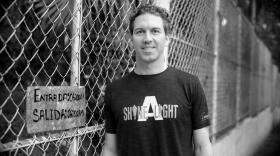Poet
There’s probably no better way to definitively turn off someone iffy about poetry than with the grim phrase, “April is National Poetry Month.” If there’s anything that refuses to dovetail with a didactic, institutional awareness campaign, it’s poetry. So consider this pitch instead: “Poetry can teach you how to live.” That’s what Olivia Clare tells me recently over coffee when I ask: Why poetry? She delivers her answer not as some charged, grand pronouncement, but as a matter-of-fact declaration, as though she’s talking about a cool feature on a new smartphone. “I don’t mean this to sound corny or disingenuous, but I do read poems to teach me how to live,” she says. In other words, poetry does things for her — and, she insists, can do things for you. For Clare — a poet, Black Mountain Institute Ph.D. fellow at UNLV and, of course, avid poetry consumer — poetry startles, clarifies, complicates and comforts.
Poetry consumer? Yes. When Clare loves a poem, she memorizes it. “There are poems we have to have, that we have to keep to our hearts, right?” One of the first she ever memorized — and still one of her favorites — is Gerard Manley Hopkins’ famous meditation on mortality, “Spring and Fall” (“Margaret, are you grieving / Over Goldengrove unleaving? ...”) She adds: “W.S. Merwin’s ‘For the Anniversary of My Death’ is an amazing poem that will change you after you read it.” (“Every year without knowing it I have passed the day / When the last fires will wave to me ...”)
What’s with all these reflections on mortality? “I always tell my students that poems are about two things: love and death,” she says. “And, of course, then there’s the sound and rhythm working together. When all those things come together as a whole, you have a poem that makes you want to memorize it and keep it with you.” Clare’s own work is poised, removed but interrogative, and preoccupied with relationships between men and women. “Most writers have a problem that they keep working at, or a question they keep going to, and every time they go to the page or the computer, that’s the problem they’re trying to work out,” she says. “I’m trying to work out the relationship between men and women.”
Here is one of her poems, “Crossing”:
We came to a prime, a vexing, a rhythm.
A figure in granite, remote,
unused. And who has
placed it here, between
the mainframes, towers,
towers? I said, I will
take this remoteness,
and fastened he/she to my back
and stepped into the river twice twice.
As Clare settles in to the three-year Ph.D. program, Vegas is already seeping into her work. “I’ve never been in a place with such a juxtaposition between convivial spirit and then profound desert solitude. That’s a lot of what I’m getting from here. And the otherworldly landscape in itself is very inspiring.” Clare finds novelty and promise in navigating that landscape that alternates between sparkle and scarcity. “Poets and fiction writers have periods of life when they’re out in the world, having experiences, but then you have to have these moments of extreme interiority, where you’re just sitting at home, just feeling the solitude.” Now is a good time to catch Clare in her “out in the world” phase; see p. 28 for a list of poetry-related events happening this month.









